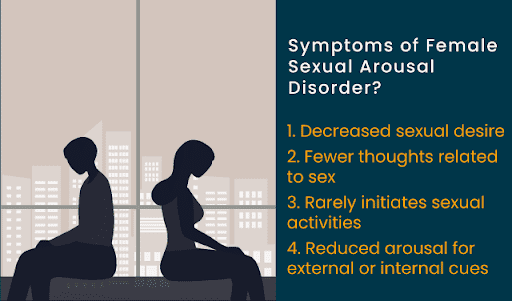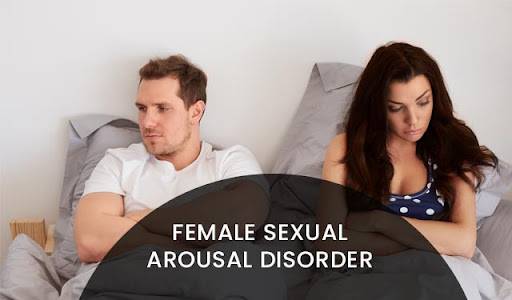Introduction
It is usual for many females to experience fluctuations in their sexual desire throughout their life. But any persistent loss of interest in sex and intimacy can signify female sexual interest or arousal disorder (F.S.I.A.D.). Females experiencing arousal disorders can have multiple symptoms that affect their mental health and relationships and lead to depression.
Our Wellness Programs
What is Female Sexual Arousal Disorder?
Female Sexual Arousal Disorder is when the body does not respond to any sexual or sensual stimuli. However, many females experience hypoactive sexual desire disorder. It is hard to distinguish between sexual dysfunction and low libido. Based on their upbringing and society, women experience some problems engaging sexually. Many women prefer refraining from sexual thoughts or fantasies because of societal stigma.
Many women experience decreased sexual desire, which can have multiple reasons. This condition is predominant if the woman has difficulty initiating sexual activity, or problems with sexual fantasy, even though she wants to have a sexual relationship. Still, her body is not responding to any stimuli. These conditions are under female sexual arousal disorder. Most common sexual dysfunctions include
Pain during intercourse
Inability to orgasm
Lack of sexual desire
Looking for services related to this subject? Get in touch with these experts today!!
Experts

Davis Emerson

India
Psychologist
Experience: 6 years

Manveen Kaur

India
Psychologist
Experience: 9 years

Esha M. Puneyani

India
Psychologist
Experience: 14 years

Banani Das Dhar

India
Wellness Expert
Experience: 7 years

Anuj Khandelwal

India
Psychiatrist
Experience: 10 years

Jateen Ukrani

India
Psychiatrist
Experience: 10 years
What are the Symptoms of Female Sexual Arousal Disorder?

- Decreased sexual desire
- Fewer thoughts related to sex
- Rarely initiates sexual activities
- Reduced arousal for external or internal cues
`1. Decreased sexual desire
Inability to get aroused or be sexually active can make you lose interest in sex. Lack of sexual desire can come from other conditions, such as severe health conditions, stress, anxiety, or any social stigma. However, if the decreased sexual desire is constant, it is time to consult a doctor.
- Fewer thoughts related to sex
Our fundamental needs as a species are the need for survival and reproduction. There is a connection between sexual needs and our brains, and at a certain point, we all love to fantasise or think about sex. It is in our innate nature to get aroused. But if you have a condition like F.A.S.D., you may find it challenging to bring any thoughts related to sex, and you may rarely think anything about sex.
- Rarely initiates sexual activities.
Many women find it challenging to get aroused and may remain unreceptive to a partner’s attempt to engage sexually. We all have different bodies; thus, many women take more time to get aroused and vice versa. However, if this condition is predominant, it may indicate a condition for F.A.S.D.
- Reduced arousal for external or internal cues
Many women do not get aroused by cues such as reading about enjoyable sex, erotic fantasy, or psychological intimacy.
What are the effects of F.A.S.D. on your relationship?
- Women with F.A.S.D. have issues getting aroused, and it can negatively impact their relationship while the partner wants to get engaged in intimacy and you cannot reciprocate. This type of condition can affect the viability of a relationship.
- Sex is a great way to release stress and anxiety and rejuvenate. However, you are even more anxious and stressed when you have arousal problems. The excess buildup of anxiety and stress ultimately hampers the relationship.
- Many women can feel insecure if they cannot perform in bed. They are dear that it might lead their partner to abandon them or find their sexual needs elsewhere.
- A social stigma worldwide regarding sex makes it extremely hard for those women who are going through this crisis and cannot speak up. They fear voicing their issues and opinions.
What can you do to manage the effects of F.A.S.D.?
- First of all, you need to acknowledge the problem you face regarding intimacy and sex.
- Talk to your partner about your problems clearly and make them understand the struggles that you are going through.
- It is always advisable to contact your doctor to address your problems and explain the symptoms.
- The doctor may give psychotherapy, medication or both, depending on the condition of your body.
- In many cases, psychotherapy works wonders where you and your partner practice exploring, giving time to each other and exercising various modes of intimacy.
- Talk to your sex expert or sex therapist, who can guide you through and help you cope with stress and anxiety.
- Past trauma also affects you significantly, refraining you from opening up. In case of such incidents, consult with your mental health caregiver, who can guide you through.
How does F.A.S.D Affect your mental health?
Sex plays a pivotal role in our daily life, and it is a necessary part of life to keep our minds and body healthy. However, if you are experiencing F.A.S.D., it can be highly overwhelming to deal with all the anxiety, stress and tension that keeps you bothered regarding sex.
Sexual dysfunction can result in bitterness in relationships, and it can impact your mental health widely. It also decreases your self-esteem and ability to address the problems with your doctor and partner.
Conclusion
Female sexual arousal disorder is prevalent among several women, and most post-menopausal women face these problems. Due to the present work lifestyle, stress and food habits cause arousal disorder among females. The extreme stress from the work and social stigmas leads to anxiety; thus, the females don’t feel safe exploring or enjoying a proper sexual relationship, leading to sexual arousal disorders. Having a healthy sexual life is equally essential. Thus, if you think you’re going through a crisis, it is always best to communicate with your partner, address the problems with your doctor, and seek any help needed to resolve the issue. In most cases, it is treatable with therapy or medication. With proper treatment, you can get back the excitement of sex.










